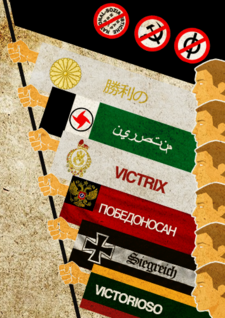Santiago Anti-Communist Treaty Organisation: Difference between revisions
| Line 126: | Line 126: | ||
==Purposes== | ==Purposes== | ||
[[File:SACTO propaganda.png| | [[File:SACTO propaganda.png|225px|thumb|right|A SACTO propaganda poster, featuring the word 'victory' in various languages alongside flags of some member states.]] | ||
* Promoting world peace and international stability through forging of a strong web of alliances. | * Promoting world peace and international stability through forging of a strong web of alliances. | ||
* Safeguarding the freedom and liberty from oppressive communist/marxist regime throughout the globe. | * Safeguarding the freedom and liberty from oppressive communist/marxist regime throughout the globe. | ||
Revision as of 14:44, 5 July 2019
This article is incomplete because it is pending further input from participants, or it is a work-in-progress by one author. Please comment on this article's talk page to share your input, comments and questions. Note: To contribute to this article, you may need to seek help from the author(s) of this page. |
Santiago Anti-Communist Treaty Organisation | |
|---|---|
| Motto: "SACTO Invictus" | |
| Anthem: "One Glorious Moment" | |
| Headquarters | Santiago, Gran Cuscatlan |
| Official languages | English |
| Type | Military alliance |
| Membership | 30 total: 20 active, 9 reserve, 1 honourary |
| Establishment | |
• Cebu Cooperation Pact | 16 March 2014 |
• Santiago Cooperation Pact | 8 July 2014 |
• As SACTO | 15 October 2014 |
Website Official website | |
The Santiago Anti-Communist Treaty Organisation (SACTO; Spanish: Organizacion del Tratado Anticomunista de Santiago) is an intergovernmental organisation and a military alliance aimed at combating and eradicating the forces of communism and its other Marxist-variants. SACTO is the successor organisation to the now defunct Axis Alliance, which was comprised of the Cebu Cooperation Pact, and its follow up organisation the Santiago Cooperation Pact. The latter was re-branded and reorganised into its present form on 8 July 2014.
Politically, SACTO is identified as right-wing; its membership, as of 5 March, 2017, consists of 28 member states of varying government types, from centrist democratic liberals to the more authoritarian absolute monarchy or military junta. Despite varying form of governments, the majority of SACTO members are considered realist - in stark contrast with member-states of the International Freedom Coalition who are generally aligned with liberalism - and all are united in their crusade against Marxist-Communism and other rogue elements throughout the international system.
Initially, SACTO was one of three dominant international alliances, alongside the International Freedom Coalition (IFC) and the United Left. It mainly found itself as being adversaries with the former, engaging in various conflicts with each other. Following the weakening and eventual dissolution of the United Left from 2014 onwards, SACTO then mainly focused its efforts in rivalling the IFC, while at the same time having countries that had duel membership of both alliance. Following a period of détente between the IFC and SACTO and the general weakening of the former due to international leadership struggles, the leadership began turning their attention towards evolving asymmetrical threats internationally from 2016 on.
History

Axis Alliance era (2014)
The precursor organisation to SACTO was the Axis Alliance — Cebu Cooperation Pact, more commonly known simply as the Axis Alliance. It was formed officially on 16 March 2014. It consisted of five core founding members; Asigna, Whiteshore, Huda, Dewhurst-Narculist and Gran Cuscatlan, and expanded when Aravea and Aeyariss joined the Axis. It went into hiatus from 29 May as a result of internal problems that led to the temporary dissolution of the Axis Alliance. Several successor organisations were founded in an attempt to replace the Axis; Central Powers, the Pacific Economic Defense Coalition, the Order of Axis, the International Capitalist Coalition and the Union of Armed States.
Conflict with the United Left (2014)
Besides the Axis Alliance, other major international organisations were the United Left (UL), a broad alliance of left-leaning countries ranging from communists to social democrats, and the International Freedom Coalition (IFC), made up of various republican and democratic countries. While these successors to the original Axis shied away from confrontation with the IFC, they continued the rivalry that had been present between the Axis Alliance and United Left. This culminated in the June Crisis, where tensions between the remnants of the Axis Alliance and the UL peaked and a global war appeared inevitable. This period of tension eventually subsided with the signing of the Saint Claire Compact and foundation of the Confluence of Six.
Foundation of SACTO (2014–2015)
The successor alliances to the Axis were short-lived. The nations of Aeyariss, Dewhurst-Narculis and Gran Cuscatlan forged a new core of Axis members and moved the new Axis Alliance headquarters to Santiago, Gran Cuscatlan, abosrbing most of the organisations that had split from the old Axis to found the Axis Alliance — Santiago Cooperation Pact. In August 2014, the founding member Asigna was suspended over allegations of power abuse, and misdirection of the Axis members. Asigna opted to leave the Alliance, severely disrupting the cohesiveness of the Santiago Cooperation Pact. In order to transform the Axis Alliance in light of Asigna's suspension and eventual removal, a new core consisting of Gran Cuscatlan, Aeyariss, Inyursta, and Dewhurst-Narculis rebranded the Axis Alliance into its present form; the Santiago Anti-Communist Treaty Organisation. SACTO immediately found itself as one of three primary international alliances, alongside the IFC and the United Left.
Meanwhile, the UL was crippled by infighting and it was eventually dissolved. Following the dissolution of the United Left in July 2015, it was replaced by the United Socialist Nations (USN). The USN was dissolved in 2016. Since then, there has been no major left-wing alliances that have challenged the power of SACTO.
SACTO and the IFC (2015–2016)
This article or section is in the process of an expansion or major restructuring. You are welcome to assist in its construction by editing it as well. If this article or section has not been edited in several days, please remove this template. If you are the editor who added this template and you are actively editing, please be sure to replace this template with {{in use}} during the active editing session. Click on the link for template parameters to use.
This article was last edited by Greater Carloso (talk | contribs) 5 years ago. (Update timer) |
Following the dissolution of the United Left, SACTO's relationship with the IFC began to break down.
The greatest loss inflicted by SACTO forces on an IFC member state was the Spring Sea Massacre, where an entire Roman fleet was sank.
Later on, tensions between the IFC and SACTO subsided, even allowing a degree of limited cooperation. Some members of SACTO hold dual membership with the IFC. Following infighting and the departure of key members, the power of the IFC has waned considerably and is now inactive.
New threats (2016–present)
As the IFC declined, SACTO found itself dealing with more assymterical threats internationally. Nifon also began to play a major role in the organisation and the Southern Furukuran Sea has become an area of particular interest.
After the destruction of the Nifon-based Sodom Front, its successor, Homofront, began an international terror campaign against SACTO and other countries with illiberal attitudes towards the normalisation of homosexuality. In retaliation for these attacks, the Commoner terrorist organisation known as the Crown Royal Guard attacked various locations in the city-state of Kesslerstaadt, killing 270 people and wounding 610. The structural integrity of the kilometre tall Babeel Tower was also compromised and subsequently demolished.
In 2017, Carloso; once a member of the IFC and generally considered hostile to SACTO, was admitted to the organisation on the recommendation of Nifon, having gone through a period of détente and reconciliation. This coincided with a change in President Cárlos Tobón's foreign and domestic policy, favouring close cooperation with right-wing, mainly authoritarian countries over liberal democracies, to combat globalist forces and growing asymmetrical threats worldwide.
SACTO forces were involved either directly or indirectly in international incidents in South Oceanica and Bangka.
Purposes
- Promoting world peace and international stability through forging of a strong web of alliances.
- Safeguarding the freedom and liberty from oppressive communist/marxist regime throughout the globe.
- Eradication of communism and marxism throughout the international system.
Members
(accurate as of 30 October 2018)
Active members
| Country | Accession | Notes |
|---|---|---|
| Aeyariss | TBC | Founding member |
| Aravea | TBC | Founding member |
| Arcerion | TBC | TBC |
| Bolrieg | TBC | Founding member |
| TBC | Founding member | |
| Gran Cuscatlan | TBC | TBC |
| Nifon | TBC | TBC |
| Flardania | TBC | Founding member |
| TBC | TBC | |
| Inyursta | TBC | Founding member |
| Isle of Lost | TBC | TBC |
| Mcnernia | TBC | TBC |
| New Edom | TBC | TBC |
| Organized States | TBC | TBC |
| Riysa | TBC | TBC |
| Romic | TBC | TBC |
| Shalum | TBC | TBC |
| Daesong | TBC | Founding member |
| 20 May 2017 | TBC | |
| Stojam | TBC | TBC |
Reservists
| Country | Accession | Notes |
|---|---|---|
| Nachmere | TBC | TBC |
| Vaakal | TBC | TBC |
| Rentalla | TBC | TBC |
| Tarkanese Federation | TBC | TBC |
| Atmaera | TBC | TBC |
| Quirina | TBC | TBC |
| New Austzeland | TBC | TBC |
| Flauc | TBC | TBC |
| Dewhurst-Narculis | TBC | TBC |
Honorary members
| Country | Accession | Notes |
|---|---|---|
| Gigaverse | TBC | TBC |


